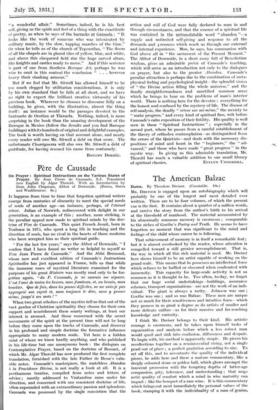Pere de Caussade
On Prayer : Spiritual Instructions on the Various States of Prayer. By Jean Pierre de Caussade, S.J. Translated into English by Algar Thorold. With an Introduction by Dom John Chapman, Abbot of Downside. (Burns, Oates and Washbourne. 6s.) IT happens from time to time that forgotten spiritual writers emerge from centuries of obscurity to meet the special needs of souls of another age—an instance, perhaps, of reternel relour. Julian of Norwich, rediscovered with delight in our generation, is an example of this ; another, more striking, is
the peculiar appeal now made to spiritual minds by the doc- trine of Pere de Caussade. This quiet French Jesuit, born in Toulouse in 1675, who spent a long life in teaching and the direction of souls, has no rival in the hearts of those moderns who have accepted him as their spiritual guide.
" For the last few years," says the Abbot of Downside, " I confess that I have found no writer so helpful to myself as Wre Jean Pierre de Caussade." And the Abbe Bremond, whose new and excellent edition of Caussade's Instructions Spirituelles has just appeared in France, tells us that while the immense mass of mystical literature examined for the purposes of his great Histoire was mostly read only to be for- gotten again, "du P. Caussade, je ne saurais me separer. C'est rand de lollies les heures, mon flambeau, et, au besoin, mon bouclier. Que de fois, dans les passes di2iciles, ne me suis-je pas approprie son esprit et, sans toujours le dire, sans y penser meme, jusqu'et ses mots ! "
When two great scholars of the mystics tell us that out of the vast garden of Christian spirituality they choose for their own support and nourishment these scanty writings, at least our interest is aroused. And those concerned with the secret movements of the spirit at the present time will not be long before they come upon the tracks of Caussade, and discover in his profound and simple doctrine the formative influence appropriate to many modern souls. Yet here is a hidden saint of whom we know hardly anything, and who published in his life-time but one anonymous book : the dialogues on Contemplative Prayer, based on the doctrine of Bossuet, of which Mr. Alger Thorold has now produced the first complete
translation, furnished with the late Father de Besse's valu- able notes. Caussade's masterpiece, the matchless Abandon a la Providence Divine, is not really a book at all. It is a posthumous treatise, compiled from notes and letters of
advice ; mostly addressed to Visitandine nuns under his direction, and concerned with one consistent doctrine of life, often expounded with an extraordinary passion and splendour.
Caussade was possessed by the single conviction that the
action and will of God were fully declared to man in and through circumstances, and that the essence of a spiritual life was contained in the untranslatable word " abandon "—a supple and unlimited self-giving and response to all the demands and pressures which reach us through our external and internal experience. Man, he says, has communion with God above all in " the sacrament of the Present Moment." The Abbot of Downside, in a short essay full of Benedictine wisdom, gives an admirable précis of Caussade's teaching, which will serve as an introduction not only to the dialogues on prayer, but also to the greater Abandon. Caussade's peculiar attraction is perhaps due to the combination of meta- physical feeling and psychological insight—the splendid vision of " the Divine action filling the whole universe," and the deadly straightforwardness and sanctified common sense which he brings to bear on the problems of man's interior world. There is nothing here for the devotee : everything for the honest soul confused by the mystery of life. The disease of self-analysis, the deadly " retour sur soi-menu," the anxiety to " make progress," and every kind of spiritual fuss, wilt before Caussade's calm exposition of their futility. His quality is well seen in these " Spiritual Instructions " ; especially in the second part, where he passes from a careful establishment of the theory of orthodox contemplation—as distinguished from the errors of the Quietists—and deals with the necessary dis- positions of mind and heart in the " beginners," the " ad- vanced," and those who have made " great progress " in the mystic way. In giving us this admirable translation, Mr. Thorold has made a valuable addition to our small library










































 Previous page
Previous page